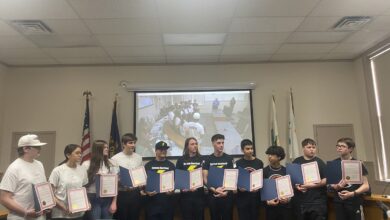Ready for robotics | Health

Two robots purchased by Northwest Medical Center have doctors
and staff excited about what it they mean for women’s health, and
audience members amazed with the technology.
Robotic surgery is nothing new at the center, with procedures
being conducted with one machine since 2006. A second robot was
added this year.
From removing tumors near ovaries to performing an all-out
hysterectomy, the technology, referred to as the Da Vinci Surgical
System, means less blood loss for the patient, less pain and
scarring, shorter hospital stays and a faster recovery time.
In a May 23 presentation, Dr. Hank V. Hallum of Arizona Oncology
presented a graphic slide show to an audience of about 50 people
describing how having robots perform various procedures is helpful
to the patients.
Hallum said Northwest Medical Center is continually increasing
the number of robotic surgeries performed each year.
The robotic surgeons are being used for prostatectomies, kidney
surgeries, pelvic prolepses, hysterectomies and
salpingo-oophorectomies.
“These instruments have wrists, which gives you a lot of
dexterity,” said Hallum. “The robots have no tremors, no shaking,
and it makes the entire procedure go very smoothly.”
After Hallum’s presentation, audience members were allowed to
use the robot surgeons to experience how easy a major surgery is
for a trained physician.
The machine sits a few feet away from the surgeon, whose head
remains fixed inside the camera where 3D, real-time imaging allows
a doctor to have increased vision and feel like they are right
there performing the procedure.
Guests were tasked with moving colored rings from one area to
another, showing how easy the three-handed machine is to
operate.
With the word “amazing” being thrown around a lot, one guest
after another filed in line to get a view of the technology that is
being used to improve patient care.
After using the equipment, Tucson resident Barry Austin said,
“It is just fantastic. I think I’m ready to do surgeries now. Just
listening to the statistics of how safe this is and the reduction
of all the negatives is just amazing.”
Chan Vandernakker, a local medical technician, said she is
impressed with the machine’s capabilities.
Hallum often referred to a hysterectomy throughout his
presentation, noting that the use of robot surgeons shortens a
woman’s hospital stay and, more importantly, dramatically decreases
the blood loss factor to as low as five tablespoons.
The Da Vinci system was created by the U.S. Department of
Defense to allow doctors and surgeons based in America to perform
critical procedures on wounded soldiers serving overseas.
“Here, you have the surgeon right there in the room,” Hallum
said.
With uterine cancer ranking only second to breast cancer in
women, Hallum said, the Da Vinci system allows the surgeon to
easily go inside and remove the bridge where cancer spreads to the
lymph nodes.
“At (Northwest Medical Center), doctors get it, and the doctors
like it,” said Hallum, referring to the number of physicians
wanting to train to use the machines. “It is more than sales; it is
about doing what’s good for the patients.”
To specialize in robotic surgery, doctors have to go through
specialized training. They start by using the machines to operate
on a pig. After mastering the procedure on a pig, they move on to
monitored procedures on humans to see if they are capable of
successfully operating the equipment unsupervised.
“For some it could take 20 procedures to master the equipment,
for others 50 and for some it may take 100 or more,” Hallum
said.
The May 23 presentation was part of the Northwest Medical
Center’s Healthy Woman program. Launched in 2008, the program
offers free classes presented by physicians or health care
professionals each month to educate women on important health and
wellness topics.
The next class will be held Monday, June 27 at 6:30 p.m. This
month’s topic has yet to be announced.



